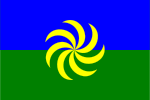Hhoti people: Difference between revisions
From MicrasWiki
Jump to navigationJump to search
No edit summary |
No edit summary |
||
| Line 17: | Line 17: | ||
| region3 = [[File:Çakaristan flag.png|25px|border]] [[Çakaristanl]] | | region3 = [[File:Çakaristan flag.png|25px|border]] [[Çakaristanl]] | ||
| pop3 = 800-1,000 (estimated) | | pop3 = 800-1,000 (estimated) | ||
| languages = [[Thraci language]], [[wikipedia:Laz language| | | languages = [[Thraci language]], [[wikipedia:Laz language|Hhoti]] | ||
| philosophies = | | philosophies = | ||
| religions = [[wikipedia:Sunni Islam|Sunni Umraism]] | | religions = [[wikipedia:Sunni Islam|Sunni Umraism]] | ||
Revision as of 10:58, 20 July 2024
| Hotiler ხოტი | |
 Flag of the Hhotia | |
| Total population | |
|---|---|
| Around 510,000 | |
| Regions with significant populations | |
| 1,929,344 | |
| 9,000 (estimated) | |
| 800-1,000 (estimated) | |
| Languages | |
| Thraci language, Hhoti | |
| Religion | |
| Sunni Umraism | |
| Related ethnic groups | |
| Eklesians | |
The Hhotis, aka the Hhoti people, are a large people living in the eastern part of Corum. The Hhoti people generally live in their own Hhotia, but there is also a small seaside community in East Zimia. Hhotis are generally of the Sunni Umraist religion and are generally quite committed to their religion, but secularization can also be seen within Hhotia territory. Although Hhotis are the majority in their own lands, they live densely around Arhavi Bay and streams because they are quite scattered. Although Hhotis generally do not have arable land, they grow tea and hazelnuts. They host many politicians and businessmen.